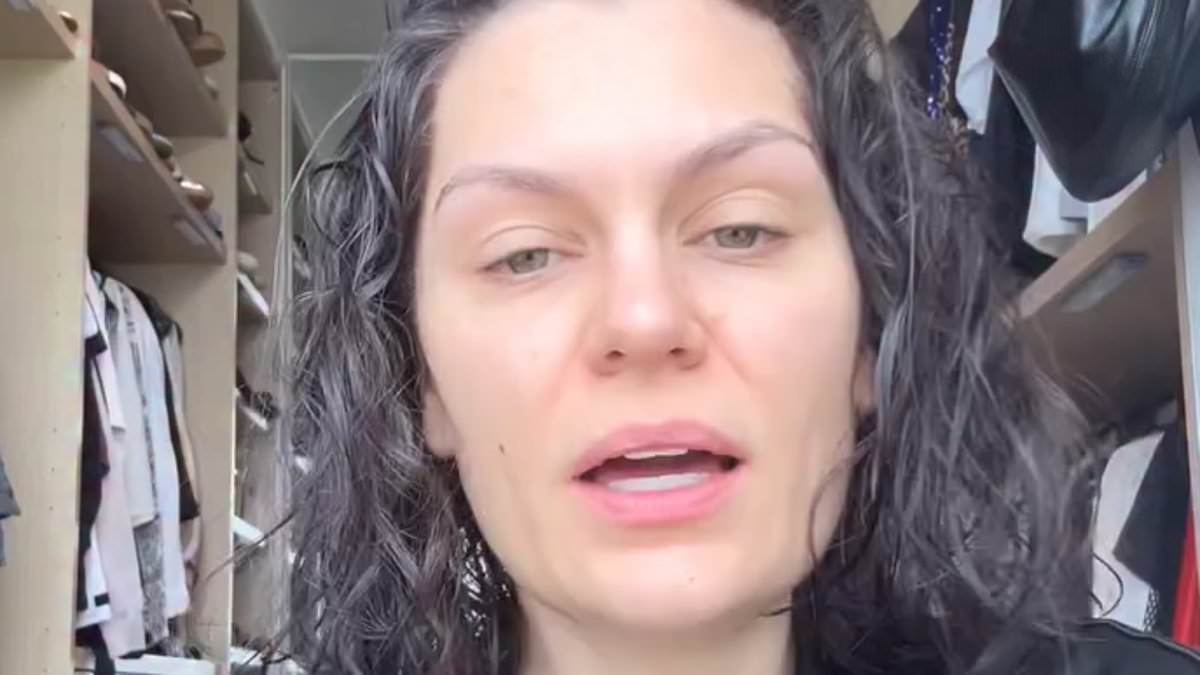Jessie J has revealed her hair has been falling out ‘like crazy’ in a candid Instagram video on Wednesday, amid her breast cancer battle.
The singer, 37, has been recovering from breast cancer surgery since June, which saw her undergo a mastectomy.
In a clip she filmed two weeks ago, Jessie also gave fans a life update as she prepares to go down for surgery again.
Jessie, who is mother to two-year-old-son Sky, said: ‘My hair has been falling out like crazy since the surgery. Five weeks today since my surgery and I’m feeling okay.
‘I’ve still got quite a lot of cording so that’s my main focus.’
Cording, also known as Axillary Web Syndrome (AWS), is a condition where cord-like structures develop under the skin, typically in the inner arm, after breast cancer surgery, especially lymph node removal.

Jessie J, 37, has revealed her hair has been falling out ‘like crazy’ in a candid Instagram video on Wednesday, amid her breast cancer battle

The singer has been recovering from breast cancer surgery since June, which saw her undergo a mastectomy
It can feel like a tight band or rope, causing pain and restricted movement in the arm and shoulder.
She added: ‘My boobs still aren’t even, it’s still so sore. And this is my old, aw you’re not old [breast]’.
‘I’m just trying to figure out what the next six months will look like. I know I can’t do everything that I was suppose to be doing but I just want to be able to make it work the best I can for everybody, me, Sky, my fans but in the right order.
‘You are always gonna leave some people disappointed. My perspective on everything has changed so much.’
Last week, Jessie revealed she has to undergo more surgery just days after she was rushed to hospital with an infection and fluid on her lungs.
While she is now back at home, the Price Tag singer revealed that she’ll soon be back in surgery, yet insisted she wouldn’t let it get in the way of parenting and making new music.
In a lengthy Instagram post, Jessie shared: ‘I can rest, parent AND release new music.
‘I didn’t leave a major label after 18 years to be scared to re write the rules to fit around my life / health and just make it realistic on what I can deliver in all roles in my life.’


In a clip she filmed two weeks ago, Jessie also gave fans a life update as she prepares to go down for surgery again
She then revealed her upcoming surgery when she penned: ‘Another surgery needed this year. I can do it.’
Jessie continued: ‘Raising a toddler. I can do it. Releasing new music. I can do it.
‘It will look different to what I had planned but that’s life, things change and either we panic and get mad that it isn’t what is was going to be, or we ADAPT.
‘I’m just flowing with life and giving the best I can. Instead of stopping and disappearing and waiting for the timing to be perfect to release music again.
‘It’s never the perfect time. Because grown up life is layered and has highs and lows and we just have to keep living in all of it. So here I am. LIVING.
‘And I just want you to have the music. Deal?’
She later added that she can be a ‘creative artist, present mother and healing patient, all at the same time’, alongside a magic ward emoji.
Jessie previously admitted she went into ‘survival mode’ upon learning of her cancer diagnosis, but is now letting herself feel angry and sad in equal measure.

Last week, Jessie revealed she has to undergo more surgery just days after she was rushed to hospital with an infection and fluid on her lungs

While she is now back at home, the Price Tag singer revealed that she’ll soon be back in surgery, yet insisted she wouldn’t let it get in the way of parenting and making new music

Jessie is mother to two-year-old-son Sky (pictured together)
Sharing an Instagram post in June, she wrote: Jessie wrote: ‘2 weeks post surgery. Had my drain out 2 nights ago. She said breathe in and take a hard breathe out. She whipped that thang out so quick. Woii oii. Weirdest feeling. But so nice to have it out after 12 days.
‘Now it’s just me and my wonky boobs trying to figure out how to dress until I match them up. The left one is looking at me like ‘you ok babe?”.
She continued: ‘Also my experience was when I was diagnosed I went into survival mode. There was so much going on with appointments and in my mind esp with a toddler I had just moved and was about to start this campaign after 8 years away. Mad.
‘I didn’t really have a lot of time to process what was happening or what was going to happen. So I’m currently experiencing some delayed sadness and frustration by having time to process what IS happening.
‘A little disappointed in myself I didn’t say goodbye to my old boob enough. Sounds silly but that’s where I’m at. Again that’s my journey. I’m sure others feel different.
‘But for me I didn’t think beyond the surgery. I was just being strong. Well now I’m here and letting myself be angry and sad and all the things. Just for a few days. Then I will sew some padding in a bra to even them out order some t-shirts and crack tf on’.
Jessie previously confirmed that she is not cancer free, a day after posting her hopes to be rid of the disease.
The singer said last month her previous post had been ‘misunderstood’ and while she was ‘praying’ for good news, the cancer at present had unfortunately not ‘all gone’.

